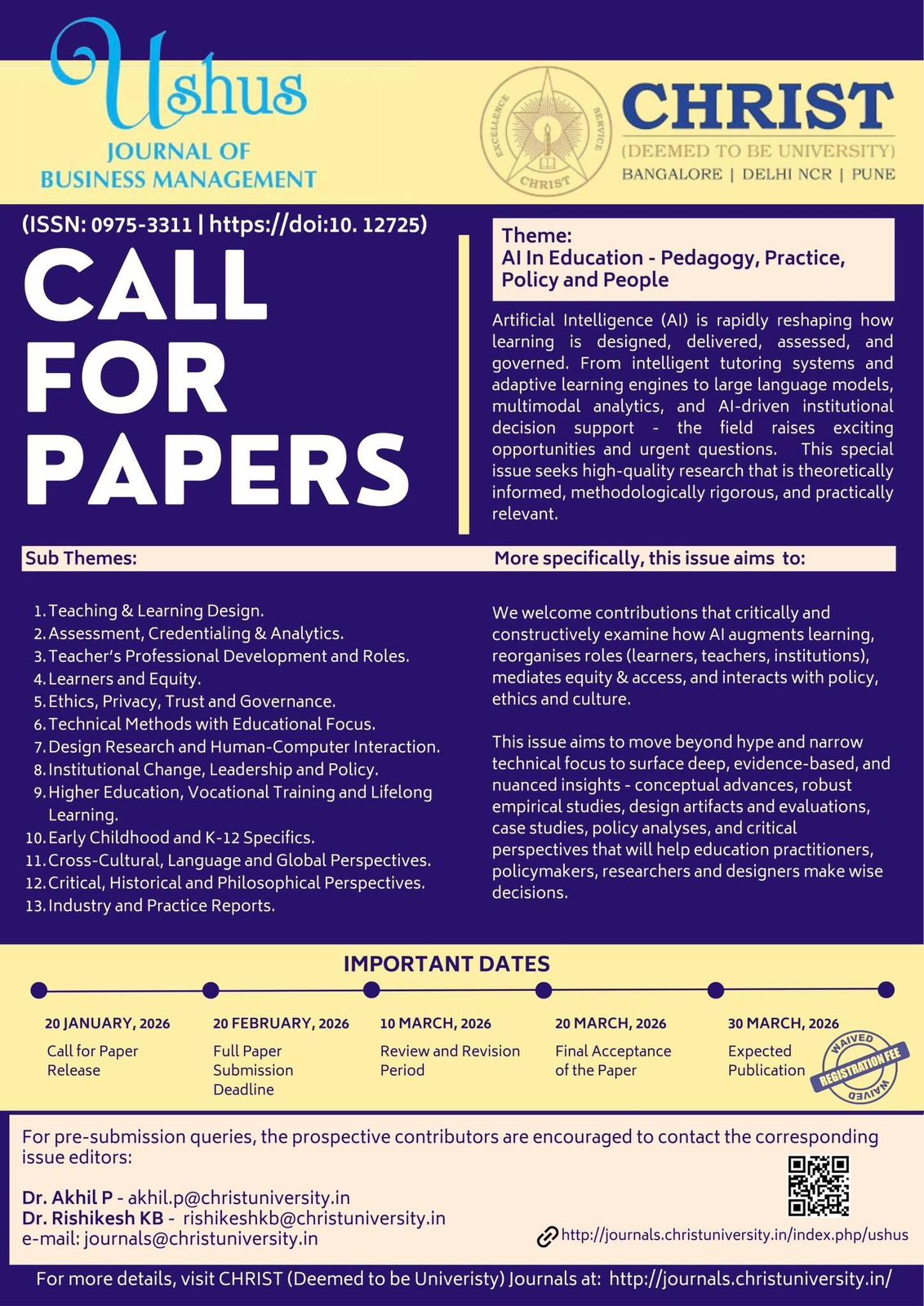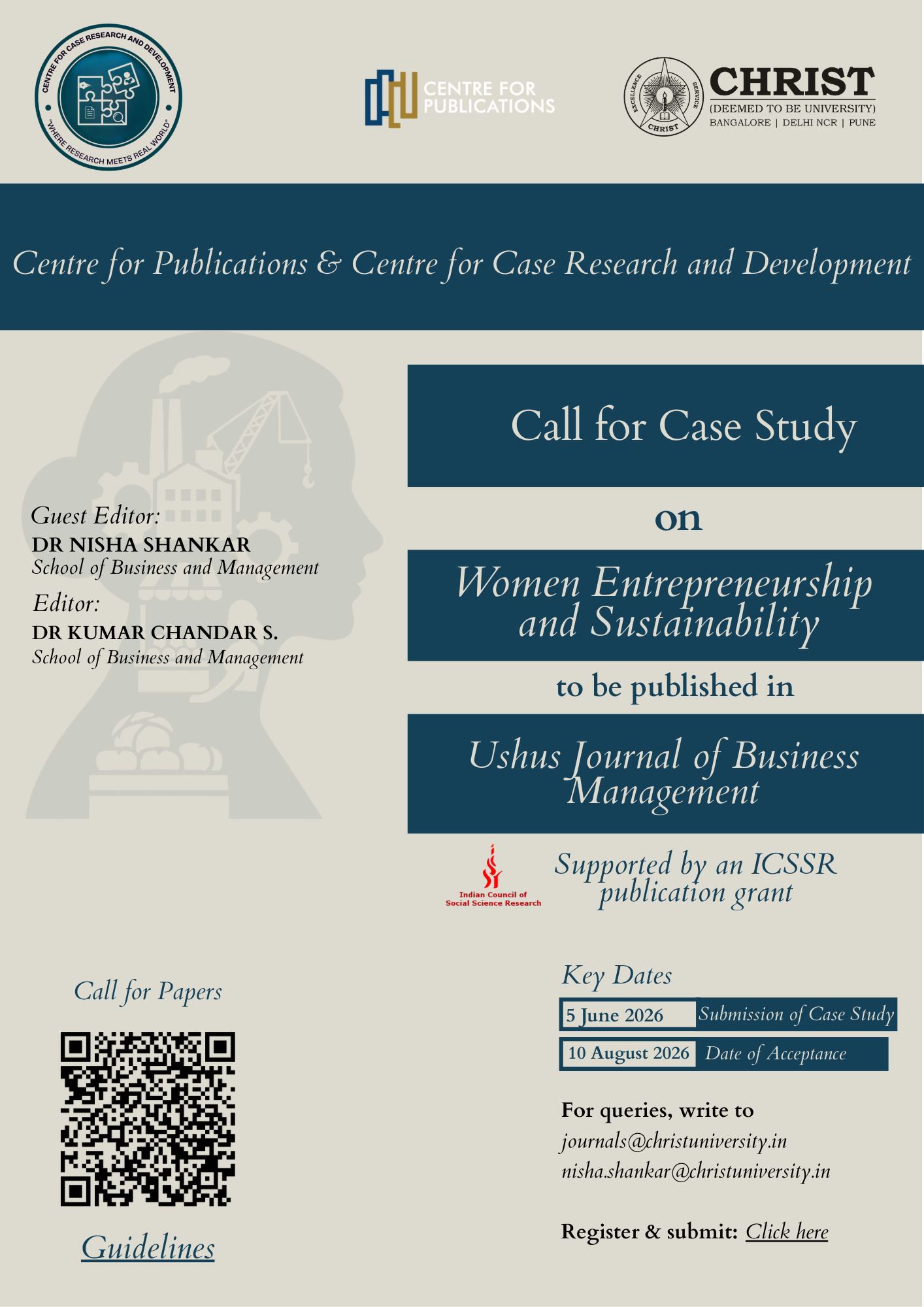Understanding the influence of workplace ostracism on employee voice behaviour: The moderating role of psychological capital
DOI:
https://doi.org/10.12725/ujbm.70.4Keywords:
Workplace ostracism, employee voice behaviour, psychological capital, resilience, promotive, prohibitive, psychology, Human resource managementAbstract
Human evolution has led to detection of social exclusion cues and tendency to stay in the presence of other’s company. This study explores the influence of workplace ostracism on employee voice behaviour, and the moderating role of psychological capital, in the Indian context. In existing literature, Workplace ostracism, the isolation that certain employees experience has been found to have significant negative effects on individual and organizational outcomes like promotive and prohibitive voice behaviour, with paucity of research in the Indian context. The sample consists of (n=144) Indian employees. Spearman’s correlation between Workplace Ostracism and Employee Voice Behaviour was found to be “Very Low negative” correlation and statistically significant (r = -.160, p < .05). The findings aim to contribute in understanding potential impact of workplace ostracism and how training employees in factors of resilience, hope, self-efficacy, and optimism can help mitigate negative effects of ostracism. The insights can help organizations develop policies and interventions to address workplace ostracism and foster a more inclusive and empowered workforce.
References
Abubakar, A. M., Yazdian, T. F., & Behravesh, E. (2018). A riposte to ostracism and tolerance to workplace incivility: A generational perspective. Personnel Review, 47(2), 441–457. https://doi.org/10.1108/PR-07-2016-0153
Anjum, M. A., Liang, D., Durrani, D. K., & Ahmed, A. (2022). Workplace ostracism and discretionary work effort: A conditional process analysis. Journal of Management & Organization, 28(2), 226–243. https://doi.org/10.1017/jmo.2019.14
Ashraf, M., Mangi, R. A., & Laghari, M. K. (2020). Study of workplace ostracism, employee engagement and interacting effect of psychological capital: A conservation of resources theory perspective. Pakistan Business Review 22(1).
Ayoko, O. B. (2022). Ostracism, Bullying and Psychological Safety. Journal of Management & Organization, 28(2), 221–225.
https://doi.org/10.1017/jmo.2022.29
Bashshur, M. R., & Oc, B. (2015). When Voice Matters: A Multilevel Review of the Impact of Voice in Organizations. Journal of Management, 41(5), 1530–1554. https://doi.org/10.1177/0149206314558302
Baumeister, R. F., & Leary, M. R. (1995). The need to belong: Desire for interpersonal attachments as a fundamental human motivation. Psychological Bulletin, 117(3), 497–529. https://doi.org/10.1037/0033-2909.117.3.497
Brison, N., & Caesens, G. (2023). The Relationship Between Workplace Ostracism and Organizational Dehumanization: The Role of Need to Belong and its Outcomes. Psychologica Belgica, 63(1), 120–137. https://doi.org/10.5334/pb.1215 18
Chaman, S., Bhatti, I., & Hussain, A. (2021). Dealing with Workplace Ostracism: The Role of Psychological Capital and Political Skill in Employee Job Outcomes. International Journal of Business and Management Sciences, 2(4), Article 4.
Dash, S., Ranjan, S., Bhardwaj, N., & Rastogi, S. K. (2023). Workplace ostracism: A qualitative enquiry. Personnel Review. https://doi.org/10.1108/PR-06-2022-0454
Deniz, S., & Çimen, M. (2022). The Mediating Role of Work Alienation in the Effect of Workplace Ostracism on Employee Voice. Hospital Topics, 1–10. https://doi.org/10.1080/00185868.2022.2116375
Dhanani, L. Y., LaPalme, M. L., & Joseph, D. L. (2021). How prevalent is workplace mistreatment? A meta-analytic investigation. Journal of Organizational Behavior, 42(8), 1082–1098. https://doi.org/10.1002/job.2534
Egozi Farkash, H., Lahad, M., Hobfoll, S. E., Leykin, D., & Aharonson-Daniel, L. (2022). Conservation of Resources, Psychological Distress, and Resilience During the COVID-19 Pandemic. International Journal of Public Health, 67,
https://doi.org/10.3389/ijph.2022.1604567
Ferris, D., Brown, D., Berry, J., & Lian, H. (2008). The Development and Validation of the Workplace Ostracism Scale. The Journal of Applied Psychology, 93, 1348–1366. https://doi.org/10.1037/a0012743
Firoz, M., & Chaudhary, R. (2021). The impact of workplace loneliness on employee outcomes: What role does psychological capital play? Personnel Review, 51(4), 1221–1247. https://doi.org/10.1108/PR-03-2020-0200
Fox, S., & Stallworth, L. E. (2005). Racial/ethnic bullying: Exploring links between bullying and racism in the US workplace. Journal of Vocational Behavior, 66(3), 438–456. https://doi.org/10.1016/j.jvb.2004.01.002
Harvey, M., Moeller, M., Kiessling, T., & Dabic, M. (2019). Ostracism in the workplace. Organizational Dynamics, 48(4), 100675. https://doi.org/10.1016/j.orgdyn.2018.08.006
Howard, M. C., Cogswell, J. E., & Smith, M. B. (2019). The Antecedents and Outcomes of Workplace Ostracism: A Meta-Analysis. Journal of Applied Psychology http://dx.doi.org/10.1037/apl0000453 19
Jahanzeb, S., & Newell, W. (2022). Co-worker ostracism and promotive voice: A selfconsistency motivation analysis. Journal of Management & Organization, 28(2), 244–260. https://doi.org/10.1017/jmo.2020.22
Kamboj, K., & Garg, P. (2022). Workplace ostracism scale: Examining the psychometric properties on Indian sample. International Journal of Business Excellence, 28, 253. https://doi.org/10.1504/IJBEX.2022.126908
Li, C.-F., & Tian, Y.-Z. (2016). Influence of Workplace Ostracism on Employee Voice Behavior. American Journal of Mathematical and Management Sciences, 35(4), 281– 296. https://doi.org/10.1080/01966324.2016.1201444
McFadden, C., & Crowley-Henry, M. (2018). ‘My People’: The potential of LGBT employee networks in reducing stigmatization and providing voice. The International Journal of Human Resource Management, 29(5), 1056–1081.
https://doi.org/10.1080/09585192.2017.1335339
Mlika, M., Khelil, M. B., & Salem, N. H. (2017). Organizational Ostracism: A Potential Framework in Order to Deal with It. Safety and Health at Work, 8(4), 398–401. https://doi.org/10.1016/j.shaw.2017.03.001
Parent, J. D., & Lovelace, K. J. (2018). Employee engagement, positive organizational culture and individual adaptability. On the Horizon, 26(3), 206–214. https://doi.org/10.1108/OTH-01-2018-0003
Prihatsanti, U., & Handoyo, S. (2020). The Role of Psychological Capital on Employee Voice: Conservation Resources Framework. Journal of Educational, Health and Community Psychology, 9(2). 10.12928/JEHCP.V9I2.16169
Shahabuddin, Tan, Q., Ayub, A., Fatima, T., Ishaq, M., & Khan, A. (2022). Workplace ostracism and employee silence: An identity-based perspective. Kybernetes.
Sivakumar, & Arulkumar. (2022). Impact of Workplace Ostracism on Voice Behaviour with the mediating role of political skill among private school teachers in Chennai. Journal of Information and Computational Science, 11, 423 – 432.
Wilkinson, A., & Fay, C. (2011). New times for employee voice? Human Resource Management, 50(1), 65–74. https://doi.org/10.1002/hrm.20411 20
Wu, L., Yim, F. H., Kwan, H. K., & Zhang, X. (2012). Coping with Workplace Ostracism: The Roles of Ingratiation and Political Skill in Employee Psychological Distress. Journal of Management Studies, 49(1), 178–199. https://doi.org/10.1111/j.1467-6486.2011.01017.x
Wu, W., Qu, Y., Zhang, Y., Hao, S., Tang, F., Zhao, N., & Si, H. (2019). Needs frustration makes me silent: Workplace ostracism and newcomers’ voice behavior. Journal of Management & Organization, 25(5), 635–652. https://doi.org/10.1017/jmo.2017.81
Wu, W., Wang, H. (Jason), & Lu, L. (2018). Will my own perception be enough?: A multilevel investigation of workplace ostracism on employee voice. Chinese Management Studies, 12(1), 202–221. https://doi.org/10.1108/CMS-04-2017-0109
Zheng, Yang, Yue Ngo, Yu Liu, & Jiao. (2016). Workplace ostracism and its negative outcomes: Psychological capital as a moderator.
Downloads
Published
How to Cite
Issue
Section
License
Copyright (c) 2025 Aashikaa Srinivasan

This work is licensed under a Creative Commons Attribution-NonCommercial-NoDerivatives 4.0 International License.



